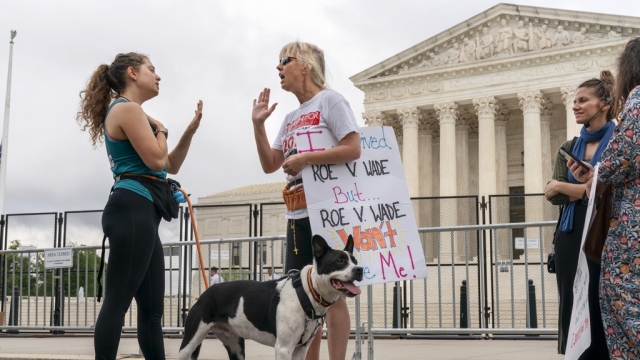One year after the Supreme Court's landmark decision that changed reproductive rights around the country, abortion laws vary greatly from state to state.
With Washington unlikely to settle the debate anytime soon, the politics of abortion very much depends on the state in which you live. The more progressive the state, the more likely reproductive rights are protected.
The more conservative the state, the more likely new restrictions are in place.
Regardless of the state in which you live, the reality is abortion politics is focusing greatly on ballot measures.
Ohio Battleground No. 1
The Buckeye State may be ground zero in the reproductive rights fight of 2023.
For months, organizers have been collecting signatures across the state. They have until early July to submit signatures to the state to get an abortion measure on this November's ballot.
Nearly 413,000 signatures are needed, and organizers are committed to reaching that goal. What's happening in Ohio isn't unique.
SEE MORE: Wyoming judge suspends a new law that would have banned abortion pills
Since the Supreme Court's landmark decision, six states have held ballot measures on abortion.
It's possible nearly a dozen states — from Florida to Iowa — will hold votes on the issue either in 2023 or 2024, according to Ballotpedia, a nonpartisan group that tracks potential elections.
Ohio is, for the moment, the only abortion vote expected in 2023.
Last year, each time an abortion-related election occurred, the side pushing for more reproductive rights won. That's why, in Ohio, there is an eagerness by progressives to get the issue on the ballot.
"Whenever abortion is on the ballot, it wins," Anastasia Martinez with Ohio Women's Alliance said.
Martinez says her group is doing this because there is concern that conservatives who lead the state legislature and state Supreme Court will soon restrict access.
In the last year, 14 states have banned most abortions.
In Ohio, abortion prior to 22 weeks of pregnancy is currently permitted. However, the state Supreme Court could soon allow a law banning most procedures after six weeks.
Until the opinion is issued, the law is on hold. If Martinez's ballot measure passes though, it would place abortion protections in the state Constitution.
"There is a fear, but there is also a lot of optimism," Martinez said.
SEE MORE: CDC reports fewer babies were born in 2022, among other new trends
Conservatives playing defense
A year later, the tactic for progressives is very different from that of conservatives.
For perspective, we spoke with Elizabeth Marbach with Ohio Right to Life, a group that advocates against all elective abortions unless the health of the mother is at stake.
After years of fighting to get conservative judges and lawmakers in the right places, she says groups like hers are committed to protecting what they achieved last year.
Part of that includes making it harder for reproductive rights groups to get ballot measures passed.
In August, voters will decide on a separate ballot measure that would change the threshold an issue needs to reach to make it into the state Constitution.
Currently, in Ohio, you need 50% plus one of the voters statewide to amend the Constitution. If the ballot measure in August is approved, any change would need 60% support instead from voters.
Collecting signatures isn't the only way to create a ballot measure in Ohio; conservative state lawmakers have the right to create a ballot question themselves, and they did just that last month.
We asked Marbach if the ballot measure to change the Constitution was a direct result of fearing that this issue was going to be before voters this fall.
"Absolutely, I think that is a motivating factor. It would not be truthful to say otherwise," Marbach said.
"The strategy is still the same — advocating for life," Marbach added.
One thing is abundantly clear, one year removed from the Supreme Court decision: The political fight over abortion is not over. It just looks different. Instead of protests and cases in Washington, it may involve someone asking for your signature at a local park.
Trending stories at Scrippsnews.com




